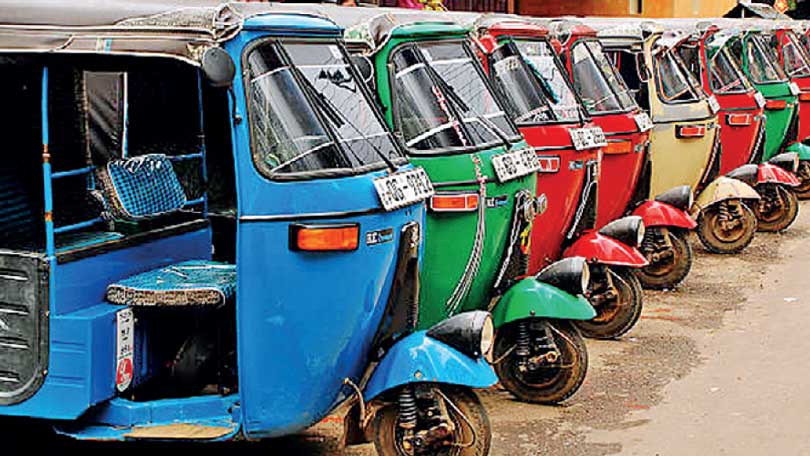Wednesday Feb 25, 2026
Wednesday Feb 25, 2026
Tuesday, 21 January 2025 00:02 - - {{hitsCtrl.values.hits}}

Traditional taxi operators in Sri Lanka, particularly three-wheeler drivers, have long claimed territorial rights over specific areas
 Recent incidents involving violence against app-based ride-hailing drivers in Sri Lanka highlight a disturbing trend: the clash between traditional taxi operators and digital platforms. This issue is not just about transportation. It’s a deeper reflection of resistance to progress, undermining law and order, and threatening Sri Lanka’s tourism as well as economic future.
Recent incidents involving violence against app-based ride-hailing drivers in Sri Lanka highlight a disturbing trend: the clash between traditional taxi operators and digital platforms. This issue is not just about transportation. It’s a deeper reflection of resistance to progress, undermining law and order, and threatening Sri Lanka’s tourism as well as economic future.
A broken system: The territorial mentality of transport
Traditional taxi operators in Sri Lanka, particularly three-wheeler drivers, have long claimed territorial rights over specific areas. This misguided idea of exclusivity has created an environment where innovation, such as app-based services, is met with hostility. The recent assault of a German tourist travelling in an app-based taxi underscores the severity of the problem. Such incidents harm Sri Lanka’s image as a safe and hospitable destination.
What makes this worse is ride-hailing services such as PickMe and Uber that are being attacked, are integral to bringing tourists to these areas, bridging gaps traditional operators fail to cross. Instead of welcoming the opportunities brought by technology, they intimidate and harass, ignoring the long-term damage to their own livelihoods and the nation’s reputation.
Impact on tourism: A dangerous spiral
Sri Lanka’s tourism industry is heavily reliant on positive traveller experiences. However, incidents of overcharging (sometimes up to four times the actual fare), harassment, and even violence are increasingly becoming part of the narrative shared by tourists online. Influential travel bloggers and backpackers who once praised Sri Lanka’s beauty, now warn potential visitors about these negative experiences.
Global tourism thrives on shared opinions, reviews, and recommendations, and negative experiences quickly become part of the narrative. The stakes are high. Cities and regions can soon gain a reputation as “unfriendly” or “unsafe,” leading to long-term tourist arrivals decline. With tourism accounting for a significant share of Sri Lanka’s GDP, the consequences of such behaviour extend far beyond individual operators; it threatens the entire economy.
A global shift: The digital transformation of urban mobility
Across the world, app-based platforms like Uber and PickMe are revolutionising urban transport. These services offer convenience, transparency, and accountability, all of which are critical for modern travellers. They democratise income opportunities, allowing students, housewives, and unemployed individuals to earn a living, and they provide consumers with reliable, fairly priced options.
Traditional operators resisting this change are clinging to outdated practices that are increasingly irrelevant in a digital world. In contrast, countries like India and Thailand have embraced these platforms, balancing regulation with innovation to create a harmonious ecosystem.
Sri Lanka’s missed opportunities
Sri Lanka has attempted to integrate modern transport solutions. Initiatives such as shuttle services between Bandaranaike International Airport and key locations like Colombo Fort Railway Station and Makumbura Multimodal Transport Terminal, complete with airline check-in facilities, were introduced to enhance accessibility and convenience for air travellers. However, these services were haphazardly stopped due to pressure from traditional taxi operators leveraging political influence.
This pattern of resistance to progress stymies efforts to modernise the sector. By bowing to pressure from a small but vocal minority, the Government undermines broader efforts to improve the transportation experience for locals and tourists alike.
A tourist-friendly transport ecosystem
Sri Lanka’s tourism and economic potential depend on fostering a safe, innovative, and welcoming environment. By embracing digital transformation and standing firm against regressive forces, the nation can secure a brighter, more prosperous future for its transport sector and beyond.
Sri Lanka’s transport sector is undergoing transformative changes that not only address local inefficiencies but also cater to the needs and expectations of international tourists. These initiatives aim to provide visitors with a seamless travel experience, standards comparable to or exceeding those of global tourist destinations.
Ensuring safety on the roads is essential for both residents and tourists, and one of the key innovations in this area is the De-merit and Spot Fine System, which not only enhances road safety but also creates a more secure environment for visitors navigating the country’s roadways. By streamlining traffic violations and penalty processes, this system encourages safer driving practices and improves overall traffic management.
In addition to road safety, Sri Lanka is improving its public transport infrastructure to meet needs of both locals and tourists. The Pravesha smart ticketing system for railways is a step toward making train travel easier and more efficient. With features like reservations and automated gates, Pravesha introduces a seamless experience for travellers. This phased rollout of the system mirrors the efficiency found in major tourist destinations worldwide, ensuring that visitors can travel across the island effortlessly.
To further enhance the public transport experience, the Automated Fare Collection (AFC) system is being implemented on Sri Lankan buses. This cashless ticketing system brings the country’s public transport up to international standards, offering tourists an easy, secure, and convenient way to pay for rides.
AFC makes travel more accessible by eliminating the need for physical cash transactions, thus aligning Sri Lanka’s transport systems with the expectations of global travellers.
The introduction of an Integrated Transport System (ITS) ensures that tourists can move seamlessly across the island. Coordinated timetables, vehicle tracking, and efficient terminal operations help minimise logistical challenges and enhance the overall travel experience. With these improvements, visitors can navigate Sri Lanka with confidence, knowing they have a reliable, well-organised transport network at their disposal.
Finally, the implementation of Free Flow Tolling on expressways is set to revolutionise the way tolls are collected in Sri Lanka. By eliminating the need for physical toll booths, this system reduces congestion and ensures smoother travel for both tourists and locals. The shift to free-flow tolling represents a modernisation of the country’s infrastructure, aligning it with global standards for fast, efficient, and convenient travel, making the journey across Sri Lanka even more enjoyable.
These initiatives are vital for creating a tourist-friendly transport ecosystem. A modernised, reliable, and accessible public transport network not only enhances the convenience of travel for visitors but also boosts Sri Lanka’s reputation as a world-class tourist destination. By integrating these technologies, the country can redefine its appeal, providing a safer, more efficient, and enjoyable experience for all who visit.
The way forward: Regulation and accountability
Addressing the challenges within the transportation sector requires swift and decisive action to create a balanced and fair environment for all stakeholders involved.
One critical step is to put in place clear regulations for digital platforms. The Government must craft a legal framework that allows both traditional and digital operators to coexist, ensuring fair competition and safeguarding the interests of drivers, passengers, and service providers alike. Such regulations must also prioritise safety and accountability, providing a solid foundation for sustainable growth in the sector.
In parallel, public awareness campaigns play a pivotal role in bridging the gap between traditional and app-based services. Tourists and locals alike need to be informed about their rights and benefits of using transparent, app-based platforms. By highlighting the convenience, safety, and affordability these services offer, such campaigns can help shift public perception and encourage greater adoption, ultimately driving positive change in the sector.
Equally important is the enforcement of law and order. Authorities must take a strong stance against any form of intimidation or harassment aimed at app-based drivers. Such behaviour must not be tolerated, particularly in a sector as vital as transportation.
Ensuring a safe and respectful environment for both drivers and passengers is essential for maintaining trust and stability and must be a priority for law enforcement agencies. Through these combined efforts, the transportation system can be reshaped into a safer, more efficient, and inclusive space for everyone.
A call for change
The ongoing conflict between traditional taxi operators and digital platforms is more than a turf war, it’s a battle between stagnation and progress. Sri Lanka cannot afford to let fear of change dictate its future. The transport sector must evolve to meet the needs of modern consumers and align with global best practices.
The time to act is now. Anything less is a disservice to every Sri Lankan citizen and visitor.
(The writer, an electronics and telecommunication engineer and a former Secretary to the Ministry of Transport and Highways, has over two decades of experience in public sector governance, telecommunications and higher education, and has led transformative projects across these fields. He spearheaded major reforms and infrastructure projects aimed at modernising Sri Lanka’s transport sector, focusing on sustainable growth, connectivity, and policy advancement. He was the Founder, President, and Vice-Chancellor of SLTC, Sri Lanka’s first research university, and a former CEO of Mobitel. Some of the key positions he has held include directorships at the Sri Lanka Telecom, National Transport Commission, Road Development Authority and Lanka Sathosa Ltd.)